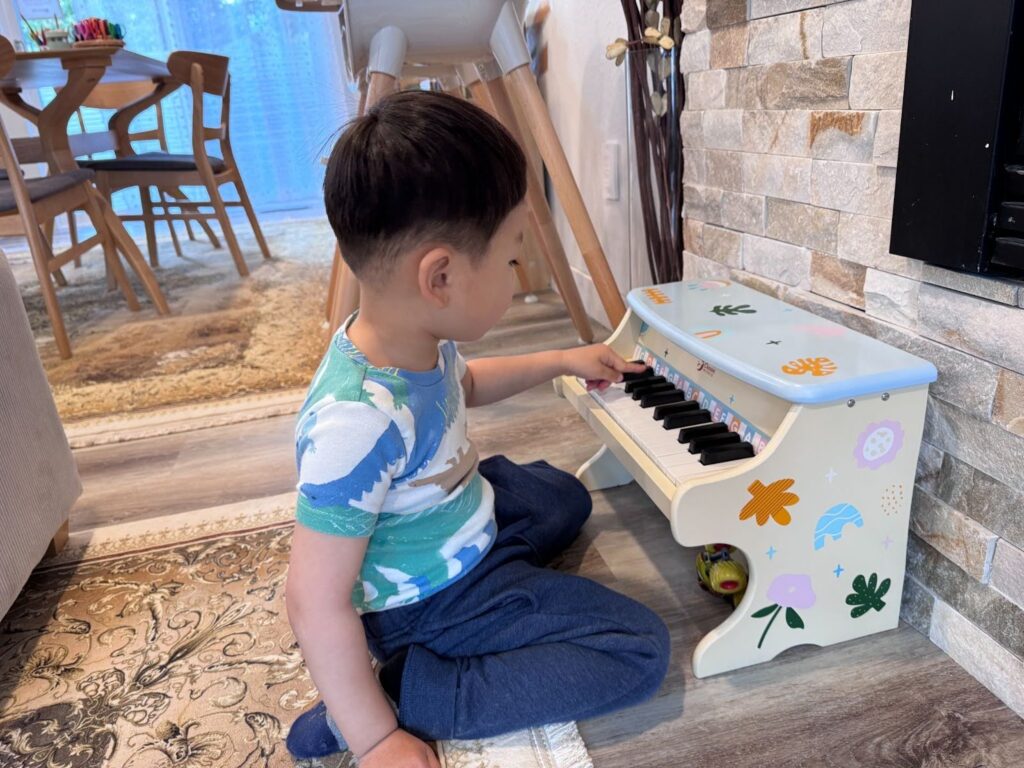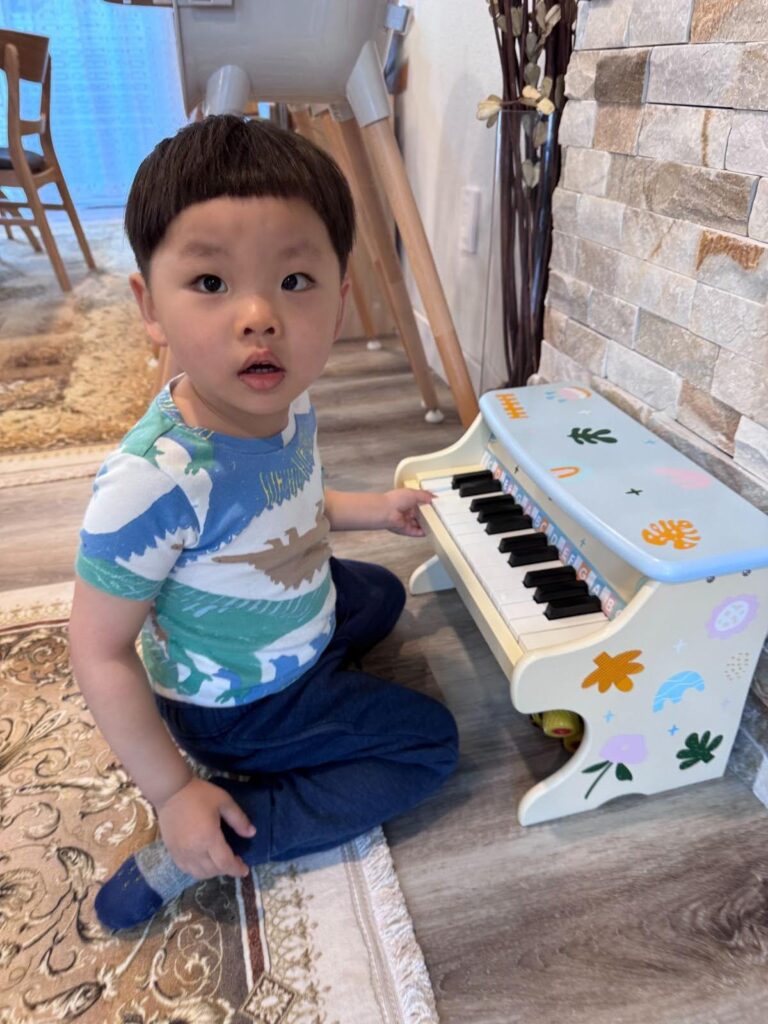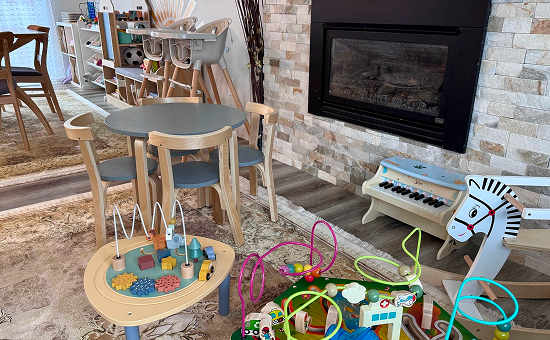At Kido Heaven Child Care in Bothell, WA, we believe that music is more than just a joyful part of the day—it’s a powerful developmental tool. Whether children are exploring rhythm, learning to press keys, or dancing to their favorite tunes, music plays an important role in early brain development.
Imagine your child tapping the keys of a piano, giggling as they create their own little tune. It’s not just play—it’s a powerful way to help them grow smarter, stronger, and happier. Music, especially piano play, is like a superfood for young brains, sparking skills that last a lifetime.
A 2016 study from the University of Southern California found that music in early childhood boosts brain development, especially for language and reading. When kids explore a piano, they’re building skills like talking, thinking, and even making friends—all while having fun. This article dives into why piano play is so special for kids ages 1–5, how it gets them ready for school, and easy ways you can bring music magic home.

Why Piano Play Is a Game-Changer for Young Kids
Music lights up every part of a child’s brain, from language to emotions to movement. Piano play is extra special because It activates language centers, strengthens memory pathways, and supports physical coordination. But more importantly, it nurtures joy, curiosity, and emotional connection.
Here’s how piano play works its magic:
1. Talking and Reading Made Fun
When kids tap piano keys, they hear different sounds—like high or low notes. This helps them notice the tiny differences in words, which is key for learning to read. For example, 3-year-old Mia started copying simple piano melodies at her daycare and soon got better at saying new words clearly.
Did You Know? A 2018 study in Frontiers in Psychology showed that music training helps kids understand word sounds, making reading easier.
2. Brain Power for Smart Kids
Playing the piano teaches kids that pressing a key makes a sound (like a mini science experiment!). They also practice remembering tunes or playing notes in order, which is great for math and problem-solving. Four-year-old Sam loved repeating a short piano song, and his parents noticed he got better at puzzles, too.
Science Says: The National Association of Music Merchants (NAMM) Foundation found that kids who play instruments often score higher in math and science because they’re pros at spotting patterns.
3. Strong Hands for School
Tapping piano keys strengthens the little muscles in a child’s hands. This helps them hold a pencil, zip their jacket, or eat with a fork. Two-year-old Lily spent weeks banging on a toy piano, and her teacher saw her drawing straighter lines in class.
4. Expressing Feelings Without Words
Kids don’t always know how to say “I’m sad” or “I’m excited.” Playing the piano lets them share their feelings through music. After a tough day, 3-year-old Ethan played soft notes to calm down, showing he was learning to manage his emotions.
5. Making Friends Through Music
When kids play piano together, they learn to take turns and cheer each other on. At a preschool music session, kids clapped as each friend played a tune, creating giggles and teamwork. These moments build friendships that make kids feel safe and happy.
Piano Play and Montessori: A Perfect Match
The Montessori approach is all about letting kids explore and learn on their own, and piano play fits right in. Kids love the piano’s sounds and patterns, and they get to create music in their own way. Here’s why it’s a Montessori favorite:
Freedom to Explore: Kids choose how to play, sparking their imagination.
Learning by Trying: If a note sounds wrong, they figure it out themselves, like a little detective.
Feeling Proud: When 4-year-old child played her own “song” for her friends, she stood taller and smiled bigger.
Child-sized pianos or toy keyboards are perfect for this—they’re safe, simple, and let kids dive into music with no pressure, just joy.
How Piano Play Gets Kids Ready for School
Piano play is like a secret tool for school success. It builds skills kids need in kindergarten and beyond, such as:
- Focus and Listening: Practicing a tune helps kids stay focused, like when 5-year-old Noah worked hard to play his favorite song perfectly.
- Memory Skills: Remembering notes helps kids learn letters, numbers, and more.
- Staying Calm: Waiting for a turn or playing softly teaches kids to handle big feelings.
- Working Together: Playing with others builds teamwork, like when kids shared the piano and clapped for each other.
These skills line up with early learning goals across the U.S., helping kids start school confident and ready.
Research Insight: A 2020 study in Developmental Science found that music activities improve self-regulation, helping kids stay calm and focused in class.

Bringing Piano Play Home: Easy Ideas for Parents
You don’t need a real piano—or a big budget—to make music part of your child’s day. Here are fun, simple ways to spark learning at home:
- Sing and Dance: Play a favorite song and let your child dance or tap on a toy xylophone. Pots and spoons make awesome drums!
- Play with Rhythms: Clap a beat (like clap-clap-pause) and have your child copy it. It’s a game that boosts memory.
- Make Homemade Instruments: Fill a bottle with rice for a shaker or use a box as a drum. Kids love creating their own “band.”
- Use Songs for Routines: Sing “Clean up, clean up…” to make tidying fun or a lullaby to calm bedtime.
- Try Free Piano Apps: Apps like Piano Kids (free on iOS and Android) let kids play virtual keys on your phone or tablet.
- Share Your Culture: Sing songs from your family’s heritage, like a Spanish lullaby or an Indian folk tune. It helps your child feel proud of their roots.
Real-Life Story: One mom, Sarah, started clapping rhythms with her 3-year-old, Leo, at dinner. A month later, Leo was copying longer patterns and even “teaching” his baby sister!
Extra Tip: Record your child playing or singing and share it with family. It’s a great way to celebrate their creativity.
Music for Every Child: Inclusive and Accessible
Music, especially piano play, is for all kids, including those with special needs or from diverse backgrounds. Here’s how it works:
- For Kids with Special Needs: Piano play can be adapted for kids with motor or speech challenges. For example, 4-year-old Zara, who has low muscle tone, uses a soft mallet to tap keys, building strength and confidence.
- Cultural Connection: Include songs from your family’s culture to make music meaningful. A preschool in Seattle used a Korean lullaby shared by a parent, and the whole class loved learning it.
- Affordable Options: No piano? No problem. Toy keyboards (under $20 at most stores) or free apps bring the same benefits.
Did You Know? A 2019 study in Journal of Music Therapy found that music activities improve social skills in children with autism, helping them connect with peers.
Why Piano Play Stands Out
Unlike general music activities (like singing or dancing), piano play offers unique benefits:
- Hands-On Learning: Touching keys teaches cause-and-effect in a way singing alone can’t.
- Precision Skills: Playing notes builds fine motor control, perfect for writing and drawing.
- Creative Freedom: Kids make their own tunes, boosting imagination and confidence.
Compared to other instruments, pianos are ideal for young kids because they’re easy to use (just press a key!) and don’t require breath control (like a flute) or complex coordination (like a guitar).
Parent Story: When 3-year-old Oliver started playing a toy piano, his dad noticed he got better at stacking blocks, thanks to stronger fingers and focus.
Why Families Choose Kido Heaven
Families choose Kido Heaven Child Care because we integrate creativity, movement, and play into every part of our day. Whether it’s music, literacy, or outdoor exploration, every activity is designed to support:
✔️ WA Early Achievers quality goals
✔️ Montessori-inspired development
✔️ Strong school readiness outcomes
✔️ Cultural and family inclusion
📞 Schedule a tour or call us at 206-734-2040
🌐 Enroll now | 📍 Bothell, WAWe accept Working Connections Child Care subsidy, offer full-time care for ages 1–5, and welcome families from Bothell, Mill Creek, Lynnwood, and nearby areas.
📲 Connect With Us
Follow our musical moments, learning milestones, and joyful discoveries on:
Summary
Music at Kido Heaven isn’t just a break between lessons—it is the lesson. Piano play helps children grow cognitively, emotionally, and socially. And best of all, they love it. When learning feels this joyful, kids naturally thrive—and that’s exactly what Early Achievers and Montessori philosophies are all about.
FAQ
1. When can kids start piano play?
Kids as young as 1 or 2 can explore toy pianos or keyboards. It’s about fun and discovery, not formal lessons.
2. Do I need a real piano at home?
Not at all! Toy pianos, xylophones, or free apps like Piano Kids work just as well. It’s about playing with sounds.
3. How does piano play help with school?
It builds focus, memory, and teamwork—skills that make kindergarten easier. It also strengthens hands for writing.
4. Is piano play good for kids with special needs?
Yes! Music can be adapted for kids with motor, speech, or sensory needs, helping them grow confidence and skills.
5. How can I make music part of our family’s culture?
Sing songs from your heritage or teach them to your child’s daycare. It connects kids to their roots.



